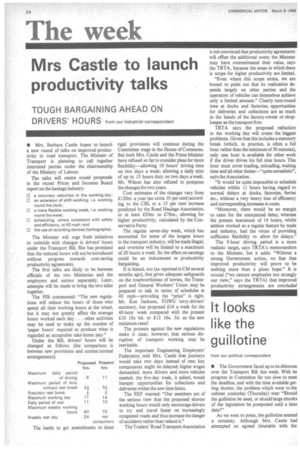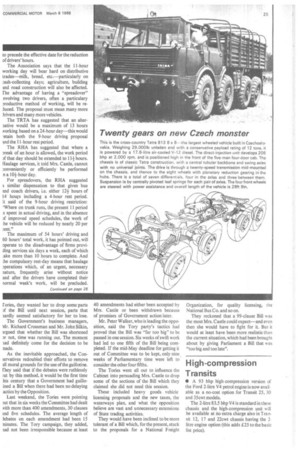It looks like the guillotine
Page 26

Page 27

If you've noticed an error in this article please click here to report it so we can fix it.
from our political correspondent
• The Government faced up to its dilemma over the Transport Bill this week. With its progress in Committee far too slow to meet the deadline, and with the time available getting shorter, the problem which went to the cabinet yesterday (Thursday) was: "Should the guillotine be used, or should large chunks of the legislation be postponed until a later date?"
As we went to press, the guillotine seemed a certainty. Although Mrs. Castle had attempted an agreed timetable with the [odes, they wanted her to drop some parts of the Bill until next session, parts that nardly seemed satisfactory for her to lose.
The Government's business managers, 14r. Richard Crossman and Mr. lohn Silkin, argued that whether the Bill was shortened or not, time was running out. The moment lad definitely -come for the decision to be rattle.
As the inevitable approached, the Con;ervatives redoubled their efforts to remove all moral grounds for the use of the guillotine. [hey said that if the debates were ruthlessly :ut by this method, it would be the first time his century that a Government had guilloined a Bill when there had been no delaying actics by the Opposition.
Last weekend, the Tories were pointing out that in six weeks the Committee had dealt with more than 400 amendments, 30 clauses tnd five schedules. The average length of lebates on each amendment had been 15 ninutes. The Tory campaign, they added, lad not been irresponsible because at least 40 amendments had either been accepted by Mrs. Castle or been withdrawn because of promises of Government action later.
Mr. Peter Walker, who is leading the opposition, said the Tory party's tactics had proved that the Bill was "far too big" to be passed in one session. Six weeks of swift work had led to one fifth of the Bill being completed. If the mid-May deadline for getting it out of Committee was to be kept, only nine weeks of Parliamentary time were left to consider the other four fifths.
The Tories went all out to influence the Cabinet into persuading Mrs. Castle to drop some of the sections of the Bill which they claimed she did not need this session.
These included heavy goods vehicle licensing proposals and the new taxes, the waterways plan, and what the opposition believe are vast and unnecessary extensions of State trading activities.
They would have been inclined to be more tolerant of a Bill which, for the present, stuck to the proposals for a National Freight Organization, for quality licensing, the National Bus Co. and so on.
They reckoned that a 99-clause Bill was the most Mrs. Castle could expect—and even then she would have to fight for it. But it would at least have been more realistic than the current situation, which had been brought about by giving Parliament a Bill that was "too big and too late".




































































































































